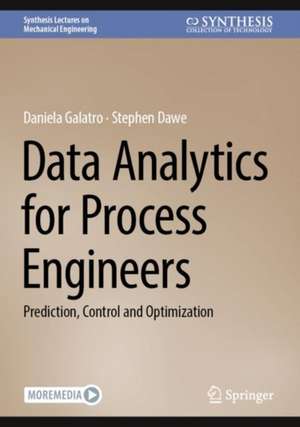Data Analytics for Process Engineers: Prediction, Control and Optimization: Synthesis Lectures on Mechanical Engineering
Autor Daniela Galatro, Stephen Daween Limba Engleză Hardback – 3 dec 2023
Din seria Synthesis Lectures on Mechanical Engineering
-
 Preț: 396.31 lei
Preț: 396.31 lei - 18%
 Preț: 577.56 lei
Preț: 577.56 lei -
 Preț: 328.08 lei
Preț: 328.08 lei -
 Preț: 199.35 lei
Preț: 199.35 lei -
 Preț: 197.44 lei
Preț: 197.44 lei -
 Preț: 326.17 lei
Preț: 326.17 lei - 15%
 Preț: 526.35 lei
Preț: 526.35 lei - 15%
 Preț: 525.54 lei
Preț: 525.54 lei -
 Preț: 207.83 lei
Preț: 207.83 lei -
 Preț: 393.52 lei
Preț: 393.52 lei -
 Preț: 320.20 lei
Preț: 320.20 lei -
 Preț: 320.40 lei
Preț: 320.40 lei -
 Preț: 488.33 lei
Preț: 488.33 lei -
 Preț: 383.72 lei
Preț: 383.72 lei -
 Preț: 224.65 lei
Preț: 224.65 lei - 19%
 Preț: 453.48 lei
Preț: 453.48 lei -
 Preț: 225.79 lei
Preț: 225.79 lei -
 Preț: 279.81 lei
Preț: 279.81 lei - 19%
 Preț: 448.41 lei
Preț: 448.41 lei - 19%
 Preț: 459.83 lei
Preț: 459.83 lei -
 Preț: 416.01 lei
Preț: 416.01 lei - 19%
 Preț: 451.30 lei
Preț: 451.30 lei - 19%
 Preț: 478.36 lei
Preț: 478.36 lei -
 Preț: 413.45 lei
Preț: 413.45 lei -
 Preț: 225.71 lei
Preț: 225.71 lei -
 Preț: 351.41 lei
Preț: 351.41 lei -
 Preț: 383.12 lei
Preț: 383.12 lei -
 Preț: 415.24 lei
Preț: 415.24 lei -
 Preț: 260.18 lei
Preț: 260.18 lei -
 Preț: 416.01 lei
Preț: 416.01 lei -
 Preț: 452.40 lei
Preț: 452.40 lei -
 Preț: 448.21 lei
Preț: 448.21 lei -
 Preț: 390.25 lei
Preț: 390.25 lei -
 Preț: 225.56 lei
Preț: 225.56 lei -
 Preț: 166.82 lei
Preț: 166.82 lei - 19%
 Preț: 447.03 lei
Preț: 447.03 lei -
 Preț: 457.72 lei
Preț: 457.72 lei - 19%
 Preț: 458.39 lei
Preț: 458.39 lei -
 Preț: 459.02 lei
Preț: 459.02 lei - 19%
 Preț: 441.30 lei
Preț: 441.30 lei - 19%
 Preț: 442.75 lei
Preț: 442.75 lei -
 Preț: 415.24 lei
Preț: 415.24 lei -
 Preț: 191.31 lei
Preț: 191.31 lei -
 Preț: 180.41 lei
Preț: 180.41 lei -
 Preț: 226.56 lei
Preț: 226.56 lei -
 Preț: 386.31 lei
Preț: 386.31 lei -
 Preț: 383.72 lei
Preț: 383.72 lei
Preț: 321.34 lei
Nou
Puncte Express: 482
Preț estimativ în valută:
61.51€ • 66.83$ • 51.70£
61.51€ • 66.83$ • 51.70£
Carte disponibilă
Livrare economică 31 martie-14 aprilie
Preluare comenzi: 021 569.72.76
Specificații
ISBN-13: 9783031468650
ISBN-10: 3031468651
Pagini: 145
Ilustrații: IX, 145 p. 159 illus., 115 illus. in color.
Dimensiuni: 168 x 240 x 15 mm
Greutate: 0.41 kg
Ediția:1st ed. 2024
Editura: Springer Nature Switzerland
Colecția Springer
Seria Synthesis Lectures on Mechanical Engineering
Locul publicării:Cham, Switzerland
ISBN-10: 3031468651
Pagini: 145
Ilustrații: IX, 145 p. 159 illus., 115 illus. in color.
Dimensiuni: 168 x 240 x 15 mm
Greutate: 0.41 kg
Ediția:1st ed. 2024
Editura: Springer Nature Switzerland
Colecția Springer
Seria Synthesis Lectures on Mechanical Engineering
Locul publicării:Cham, Switzerland
Cuprins
Sources of Data.- Exploratory Data Analysis.- Data-based modelling for prediction.- Data-based modelling for control.- Optimization.- Final remarks.
Notă biografică
Daniela Galatro is a Chemical Engineer (Ph.D. and MSc. in Mechanical Engineer) with more than 21 years of experience in the design, optimization, start-up, and operation of chemical production plants in Engineering Procurement and Construction (EPC) and manufacturing companies, as well as flow assurance, data analysis, machine learning, and computer process modelling and simulation. During her process engineering career, she increased several chemical processes' throughput, reliability, and quality. She contributed to reducing environmental impact for her employer and customers in the petrochemical, oil and gas, and refining industries. She has extensive experience abroad, including in Canada, Germany, China, Russia, and Venezuela. She is an Assistant Professor, Teaching Stream in the Department of Chemical Engineering & Applied Chemistry at the University of Toronto, Canada. She teaches Heat and Mass Transfer, Petroleum Processing, Plant Design, and Data-based Modelling for Predictionand Control. Her research includes mapping Education 4.0 and Industry 4.0, using machine learning techniques to map and track contaminants with geoelectrical surveys, and evaluating potential causes of health risk factors. She has supervised several graduate students of the Magister Engineering program, with projects involving predictive analytics and multi-objective optimization in process engineering (sulfur recovery units and amine treatment units).
Stephen Dawe is a Chemical Engineer (M.Eng. in Chemical Engineering) with an emphasis on data analytics and process engineering. He currently works as a process engineer in designing and optimizing chemical processes.
Textul de pe ultima copertă
This book provides an industry-oriented data analytics approach for process engineers, including data acquisition methods and sources, exploratory data analysis and sensitivity analysis, data-based modelling for prediction, data-based modelling for monitoring and control, and data-based optimization of processes. While many of the current data analytics books target business-related problems, the rationale for this book is a specific need to understand and select applicable data analytics approaches pragmatically to analyze process engineering–related problems; this tailored solution for engineers gets amalgamated with governing equations, and in several cases, with the physical understanding of the phenomenon being analyzed. We also consider this book strategically conceived to help map Education 4.0 with Industry 4.0 since it can support undergraduate and graduate students to gain valuable and applicable data analytics stills that can be further used in their workplace. Moreover, itcan be used as a reference book for professionals, a quick reference to data analytics tools that can facilitate and/or optimize their process engineering tasks.
Caracteristici
Includes data analytics and machine learning tools to analyze process engineering–related problems pragmatically Provides a comprehensive review of tools for monitoring, modeling, controlling, and optimizing processes Provides industry-oriented data analytics approach for process engineers
